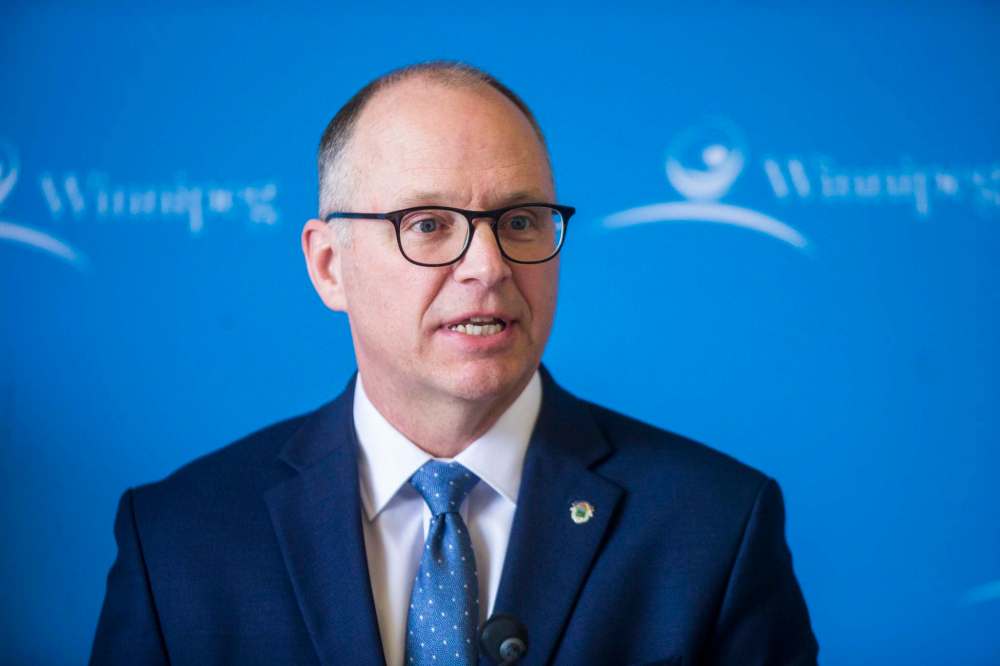City fends off bleak budget
Grim financial forecast avoided through cost-cutting efforts, federal funding
Advertisement
Read this article for free:
or
Already have an account? Log in here »
To continue reading, please subscribe:
Monthly Digital Subscription
$1 per week for 24 weeks*
- Enjoy unlimited reading on winnipegfreepress.com
- Read the E-Edition, our digital replica newspaper
- Access News Break, our award-winning app
- Play interactive puzzles
*Billed as $4.00 plus GST every four weeks. After 24 weeks, price increases to the regular rate of $19.95 plus GST every four weeks. Offer available to new and qualified returning subscribers only. Cancel any time.
Monthly Digital Subscription
$4.99/week*
- Enjoy unlimited reading on winnipegfreepress.com
- Read the E-Edition, our digital replica newspaper
- Access News Break, our award-winning app
- Play interactive puzzles
*Billed as $19.95 plus GST every four weeks. Cancel any time.
To continue reading, please subscribe:
Add Free Press access to your Brandon Sun subscription for only an additional
$1 for the first 4 weeks*
*Your next subscription payment will increase by $1.00 and you will be charged $16.99 plus GST for four weeks. After four weeks, your payment will increase to $23.99 plus GST every four weeks.
Read unlimited articles for free today:
or
Already have an account? Log in here »
Hey there, time traveller!
This article was published 12/01/2021 (1868 days ago), so information in it may no longer be current.
The City of Winnipeg now believes its budget would have fallen $92 million short in 2020, had ample federal support and cost-cutting measures not filled the gap.
Thanks to those major changes, the city now expects a deficit of $400,000 for last year’s tax-supported operating budget, based on figures up to Nov. 30, 2020.
When all city departments are considered, the financial projection is even better — with an overall operating surplus of $26.1 million expected.

“There are two main reasons that we are ending the year in an overall surplus across all city departments of $26.1 million. One is the crisis cash-flow management plan actions that were put in place through 2020, and the second is the federal Safe Restart Agreement funding,” Coun. Scott Gillingham, finance committee chairman, said Monday.
“The federal funding has helped the city fill the financial holes that were created in the 2020 budget by COVID-19, and this in turn has helped the city be in a better position to deal with the financial impacts of COVID-19 in 2021.”
Federal pandemic support provided $42.2 million to Winnipeg’s municipal government, plus another $32.3 million to its transit department. Gillingham said the city’s own cost-cutting measures, which began early on in the pandemic, were also essential to preventing major losses.
Those changes included temporary layoffs, Winnipeg Transit service reductions, and a hiring freeze.
Without those cutbacks and senior government support, the city’s latest estimate says Winnipeg’s 2020 budget would have fallen $92 million short. That would include losses of $33.1 million for the tax-supported budget, $46.4 million for Transit, and $11.2 million for special operating agencies, among other more minor shortfalls.
The all-department surplus now expected is largely credited to a $21.9-million surplus for city utilities. Gillingham noted the waterworks, sewage disposal and solid waste departments are all expected to finish 2020 with multimillion-dollar surpluses.
City spokesman Kalen Qually said those surpluses were fuelled by several factors, including: an increase in tipping fees at 4R depots; increased sewage consumption rates; and vacancy management savings.
Meanwhile, Transit now looks set to finish the year with a $3.3-million surplus, after federal funds more than erased its previously expected $28.7-million shortfall. Transit is expected to use the extra funds to offset future losses, as the pandemic continues to affect ridership.
Despite the dramatic financial improvements, Gillingham remains concerned the effects of COVID-19 could still cause a significant blow to the bottom line this year, as business closures and public health restrictions continue.
“My ongoing concern is we don’t know how long the pandemic is going to go, and we don’t know how deep its financial impact will be on the city in 2021,” he said.
The expected $400,000 deficit for 2020 is set to be covered by council’s rainy day fund.
joyanne.pursaga@freepress.mb.ca
Twitter: @joyanne_pursaga

Joyanne is city hall reporter for the Winnipeg Free Press. A reporter since 2004, she began covering politics exclusively in 2012, writing on city hall and the Manitoba Legislature for the Winnipeg Sun before joining the Free Press in early 2020. Read more about Joyanne.
Every piece of reporting Joyanne produces is reviewed by an editing team before it is posted online or published in print — part of the Free Press‘s tradition, since 1872, of producing reliable independent journalism. Read more about Free Press’s history and mandate, and learn how our newsroom operates.
Our newsroom depends on a growing audience of readers to power our journalism. If you are not a paid reader, please consider becoming a subscriber.
Our newsroom depends on its audience of readers to power our journalism. Thank you for your support.

